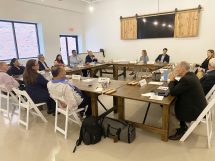
FRANKFORT, Ky. (June 6, 2018) — Two proposed Ohio River bridges have highlighted Kentucky’s need to generate more money to pay for transportation projects, the state transportation secretary told a panel of legislators yesterday.
“My primary reason for being here is to convey the need for increased funding,” Transportation Secretary Greg Thomas said while testifying before a meeting of the Interim Joint Committee on Transportation. “It’s a pretty dire outlook.”
He said he came to that conclusion as he explored how Kentucky could afford to build two proposed interstate bridges – in the next six years. One proposed bridge would create an Interstate 69 Ohio River crossing between Evansville and Henderson. The second bridge would replace an aging Brent Spence Bridge that carries Interstate 71/75 traffic between Covington and Cincinnati.
“As we learn more and more, it is becoming more and more obvious that those two bridges are going to present (financial) challenges for us,” Thomas said.
He estimated Kentucky’s share of the proposed $1.1 billion I-69 bridge to be at least $455 million. Thomas said he estimated the state’s share of the proposed $2.6 billion Brent Spence Bridge replacement to be at least $385 million. That would mean Kentucky would have $140 million a year to spend on $10.5 billion worth of proposed transportation projects, he said.
“That is kind of the message I’m here to deliver,” Thomas said. “I think it is very important that we together keep our focus on the need for increased funding as we move forward.”
Committee co-chair Sen. Ernie Harris, R-Prospect, said he appreciated Thomas “telling it as it is.”
Sen. Paul Hornback, R-Shelbyville, said Thomas was “absolutely right” and that he too appreciated the secretary’s candor.
“We need to look at some way to not just stabilize the revenue for the road fund but also increase revenue for the road fund because we have a lot of … roads that need to be maintained and upgraded,” Hornback said. “We have a lot of growth in Kentucky and we got to take care of that because, without infrastructure, we won’t have the investments in manufacturing and other things we need here in Kentucky.”
Rep. Sal. Santoro, R-Florence, asked about the impact of electric cars and hybrid cars on the amount of gas taxes collected by the state.
Thomas said he thinks it’s negligible because the 563 electric vehicles about 31,500 hybrids registered in Kentucky make up less than 1 percent of all vehicles licensed in the state. He estimated the number of electric and hybrid vehicles would only reach 3 percent in 10 years.
“I think the most pressing problem is the efficiency gains out there,” Thomas said in reference to more fuel-efficient vehicles. He said the reduction in revenue gains is tied to continued efficiency gains.




















Add Comment